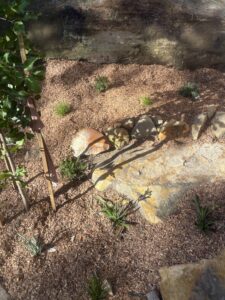Can Termites Eat Cypress Mulch in Your Garden?
Can termites eat cypress mulch?
It’s a question we often hear from clients in the Blue Mountains — especially homeowners who use mulch around their gardens and house foundations.
Cypress mulch is commonly marketed as termite-resistant, but does that mean it’s termite-proof? Let’s dig into the truth behind this popular landscaping material, how it affects termite risk, and what you can do to protect your property.

Is Cypress Mulch Termite-Proof?
No, but it is termite-resistant.
Cypress wood — particularly the heartwood — does contain natural termite-repelling oils. That’s why many suppliers and garden stores promote it as a safer option than eucalyptus or pine mulch. However, “resistant” doesn’t mean “immune.” Under the right conditions, termites can still explore or tunnel through cypress mulch, especially if other risk factors are present.
When Cypress Mulch Becomes a Termite Risk
Here’s when even termite-resistant mulch like cypress can work against you:
-
Too thick: Mulch applied thicker than 50mm can trap moisture and heat, creating ideal termite conditions.
-
Too close to the house: Mulch right up to the slab edge or weep holes allows termites to bridge into your home undetected.
-
Always damp: Shaded areas or overwatering keeps mulch moist, which attracts termites looking for a nesting site.
-
Nearby colony pressure: If there’s an active termite colony in the area, they may investigate any organic material, even resistant wood.
💡 Quick tip: Termites may not eat cypress mulch itself, but they’ll use it as cover for movement or to maintain high humidity.
Tips to Reduce Termite Risk Around Your Home
👉 Need a professional inspection? Book a Termite Treatment in the Blue Mountains
The Role of a Termite Management System
Even with good landscaping practices, mulch is just one factor. The most effective way to protect your home long-term is by installing a termite management system.
At Erase Pest Control, we recommend and install Sentricon Always Active — a premium termite baiting system that:
-
Creates a continuous protection zone around your property
-
Uses non-toxic, low-impact bait that targets the entire colony
-
Works 24/7, year-round, with minimal disruption to gardens or pets
Sentricon is ideal for properties in leafy, mulch-heavy zones like Katoomba, Wentworth Falls, Leura, and Blaxland — where termite pressure is naturally higher due to moisture and dense bushland.
🛠️ Want to learn more? See our full service:
➡️ Termite Treatment in the Blue Mountains
Better Mulch Options for Termite Protection
| Mulch Type | Termite Risk | Recommended Use |
|---|---|---|
| Cypress Mulch | Low | Garden beds away from structures |
| Hardwood Mulch | Medium | General landscaping |
| Pine/Eucalyptus | High | Avoid near buildings |
| Gravel/Rock | None | Best near walls, posts, or timber decking |
Final Word from the Field
So — can termites eat cypress mulch? Not usually. But will they exploit poor landscaping, damp mulch piles, or direct access to your home? Absolutely.
The mulch you choose matters — but how you apply and manage it matters more. Combine smart gardening with professional termite protection for true peace of mind.
📞 Book a Termite Inspection Today
Get in touch with the team at Erase Pest Control — your Blue Mountains termite experts.
-
📱 Call us: 0400 822 800
-
📧 Email: info@erasepestcontrol.com.au
-
🗓️ Book Online
Jason Twomey